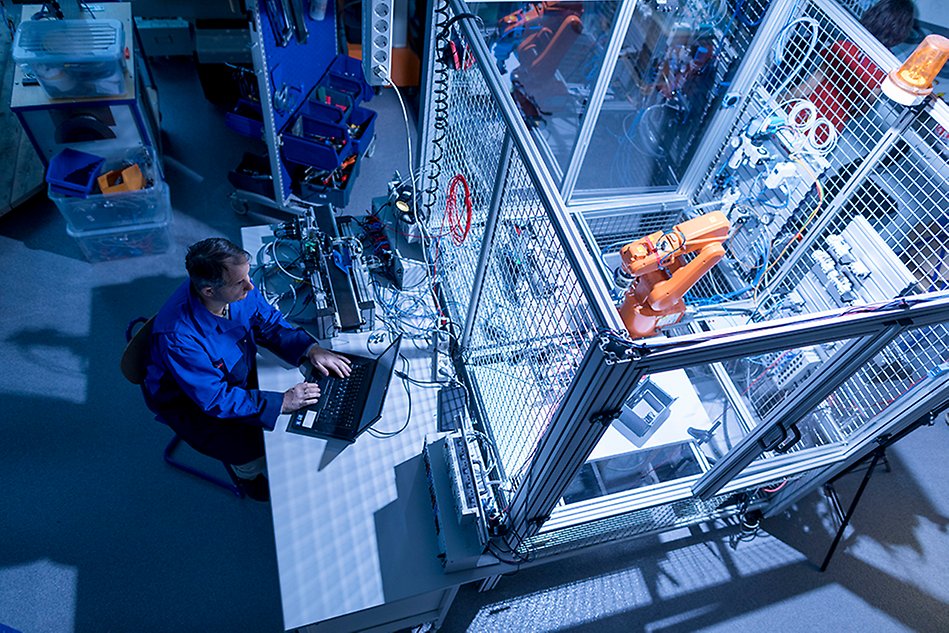FIRP – Future Industry Research Programme
The Future Industry Research Programme (FIRP) focuses on societal challenges such as resilience, global competitiveness, innovation and economic growth through collaboration and co-creation with industry. Through responsible innovation, the research programme aims to support technological progress for the benefit of society as a whole.

Ensuring continuous and responsible innovation while remaining sustainable and competitive is a major challenge for the industry today, which can only be solved through multidisciplinary collaboration between many different stakeholders.The research programme wants to contribute to meeting this major challenge.
FIRP is part of the University’s focus area Smart Cities and Communities and is in line with Industry 4.0 and Industry 5.0. This means that the research aims for increased digitisation of industry, while at the same time being socially responsible, sustainable and overall beneficial to society.
FIRP works with five of the Sustainable Development Goals: Industry, Innovation and Infrastructure; Decent Work and Economic Growth; Sustainable Cities and Communities; Gender Equality; Quality Education; and Responsible Consumption and Production.
The vision of FIRP is to promote research excellence, strengthen university-industry-society cooperation and integrate more research into education to prepare people and industry for future challenges and opportunities. The programme aims to position Halmstad University as a leader in interdisciplinary technological research and help meet modern societal and industrial needs.
Three key themes and clusters
The research programme consists of three collaborative clusters to solve complex industrial challenges. The clusters bring together researchers from disciplines such as artificial intelligence, machine learning, materials and sensors, surface metrology, cybersecurity, additive manufacturing, computer vision, autonomous systems and predictive maintenance
Innovative industry
Is primarily involved in researching and applying cutting-edge technologies and processes across a range of areas of HU strength: semiconductor technology, nanoscience, digital radar systems, sensor systems for autonomous vehicles, functional surfaces and advanced manufacturing techniques.
Resilient Industry
Works with the capacity of industrial sectors to maintain security, reliability, and sustainability amidst the challenges posed by an increasingly digital and interconnected world. This encompasses a broad range of concerns, including cyber security, data privacy and authenticity, resilience to hardware or software failures, and protection against external threats
Predictive industry
Revolves around creating systems capable of autonomous knowledge construction from real-life data generated through interactions between an industrial system and its environment. A central application within Predictive Industry is predictive maintenance (PdM), which aligns with the objective of achieving cost and efficiency gains for industries. This application is tightly connected to the use of HU’s strengths in Artificial Intelligence (AI) and Machine Learning (ML).

Image: AI generated by Ross Friel
Research questions
- How can advanced data analytics and machine learning improve industrial processes?
- What methods and technologies can improve the robustness and security of industrial systems against cyber and physical disruptions?
- How can innovative sensor technologies, materials and surfaces improve industrial capabilities?
- How can predictive models be developed to anticipate equipment failures and optimise operations?
Research projects
AI-Powered Crime Scene Analysis
Facial Analysis in the Era of Mobile Devices and Face Masks
ELLIIT – Strategic Research Environment
FREEPORT – federated learning and edge processing for safe and efficient operation
Megapixel superlattice detectors with optical metasurfaces
Quantifying Sensor Surface Contamination for Safe Vehicle Automation (QonSense)
ROADVIEW – Robust Automated Driving in Extreme Weather
SMILE IV – safety analysis and verification/validation of machine learning based systems
Participating researchers
School of Information Technology
- Abu Mohammed Raisuddin, PhD student
- Anna Vettoruzzo, PhD student
- Canberk Özen, PhD student
- Carlos Nascimento Silla Junio, Professor
- Cristofer Englund, Professor
- Edison Pignaton De Freitas, Professor
- Elena Haller, Senior Lecturer
- Emil Nilsson, Senior Lecturer
- Eren Erdal Aksoy, Senior Lecturer
- Fernando Alonso-Fernandez, Professor
- Grzegorz Nalepa, Professor
- Håkan Pettersson, Professor
- Hamid Sarmadi, Associate Senior Lecturer
- Hans Hellsten, Adjunct Professor
- Idriss Gouigah, doktorand
- Jeong Min Kang, Post Doc
- Jesper Holmblad, Research Engineer
- Joel Nyholm, PhD student
- Josef Bigun, Professor
- Kevin Hernandez Diaz, Post Doc
- Kunru Chen, Post Doc
- Mahdi Fazeli, Senior Lecturer
- Mark Dougherty, Professor
- Marlena Nowaczyk, Senior Lecturer
- Martin Cooney, Senior Lecturer
- Mohamed Eldefrawy, Senior Lecturer
- Mumpy Das, Research Engineer
- Oscar Molina, Associate Senior Lecturer
- Parisa Jamshidi, PhD student
- Per Sandrup, Research Engineer
- Peyman Mashhadi, Senior Lecturer
- Prayag Tiwari, Senior Lecturer
- Sepideh Pashami, Senior Lecturer
- Slawomir Nowaczyk, Professor
- Sundas Munir, Lecturer
- Wojciech Mostowski, Senior Lecturer
- Yuantao Fan, Associate Senior Lecturer
- Zahra Taghiyarrenani, Post Doc
- Zeinab Shahbazi, Post Doc
School of business, innovation and sustainability
More information
updated

